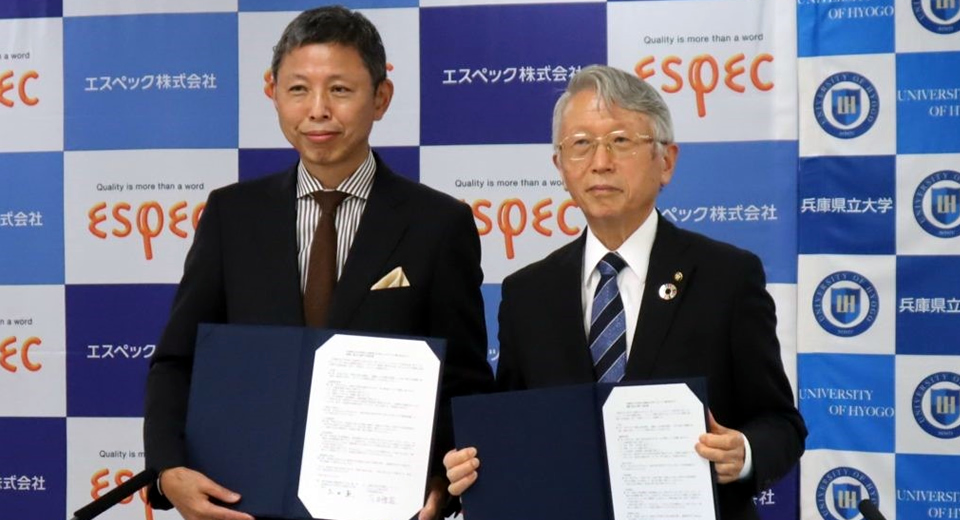
The University of Hyogo entered into a comprehensive collaboration agreement with Espec Corp (headquarters: Kita Ward, Osaka City) for the purpose of working close to promote collaborative activities to promptly and appropriately deal with various social problems such as preservation of biodiversity and issues related to the environment and energy and promote SDGs. This collaboration agreement was officially entered into at the Hyogo Prefectural Government Office on Tuesday, August 30. Also, this is the university’s first collaboration agreement regarding SDGs with a business.
Espec Corp was established in 1947. In 1961, it was the first company in Japan to develop environment testing equipment (analysis and assessment devices that reproduce environment conditions such as temperature and humidity without having an effect on the product). Since then, the company has had the top market share in the area, and is tackling the realization of SDGs through business activities centered on environmental creation technologies.
The company is contributing to the development of cutting-edge technologies through initiatives for realizing SDGs by providing environmental testing equipment to support the development of preventive safety technologies, such as automobile brakes, self-driving technologies, eco-cars, and vehicle-mounted batteries. The company also engages in environmental preservation business activities to restore the natural environment, such as forest-building using local native plants and waterside creation for restoring natural rivers. The company contributes to tackling global warming and preserving biodiversity.
The Kobe R&D Center (Kita Ward, Kobe City) is a base for technological development and development of new products and a base for promoting preservation of biodiversity. The center tackles preservation of biodiversity with an emphasis on collaboration with local regions. For example, Espec Forest is home to approximately 30,000 native trees grown by staff and their families. The company also created a rooftop garden on the technology development building using more than 30 types of native plants grown in the northern part of Rokko. The company also created a biotope consisting of two ponds and streams, and which is home to a large variety of flying birds such as spot‐billed ducks and brown-eared bulbuls.
The University of Hyogo has also been conducting education and research for achieving SDGs Goal 17. We published University of Hyogo’s Declaration Concerning SDGs in March of this year. We are concentrating our efforts on promoting SDGs to enable contribution in which the entire university can come together even more to achieve a sustainable society. For example, the university is tackling research in the field of energy such in hydrogen, which will be an important key for realizing a carbon-free society through promotion of GX (green transformation). The university also conducts surveys regarding the relationship between the natural environment that is home to wildlife and human society, makes suggestions for policies, and tackles research into the wildlife inhabiting rice paddies and rivers.
The university is also tackling a variety of initiatives such as research and implementation according to the SDGs principal of “leave no one behind”, as well as natural disaster prevention and recovery initiatives, such as surveys and research into facilitating evacuations of persons who require special assistance, such as the elderly and people with physical impairments.